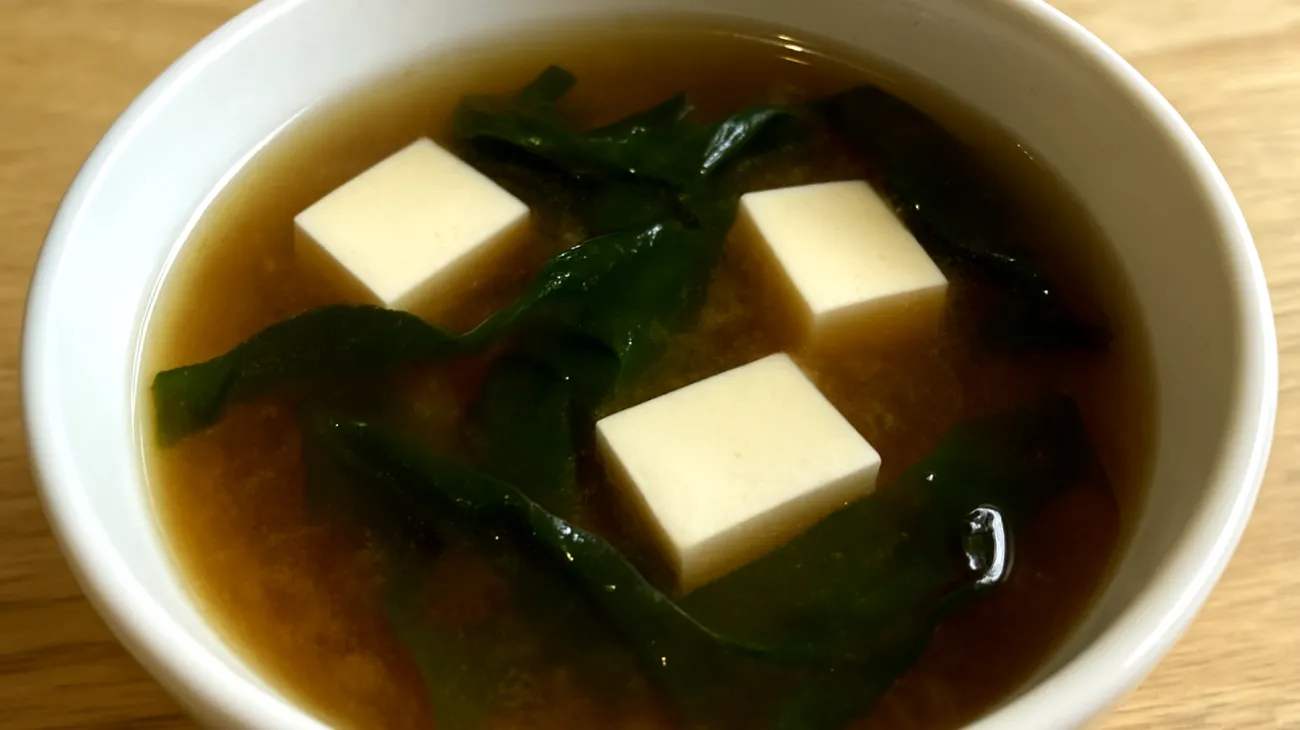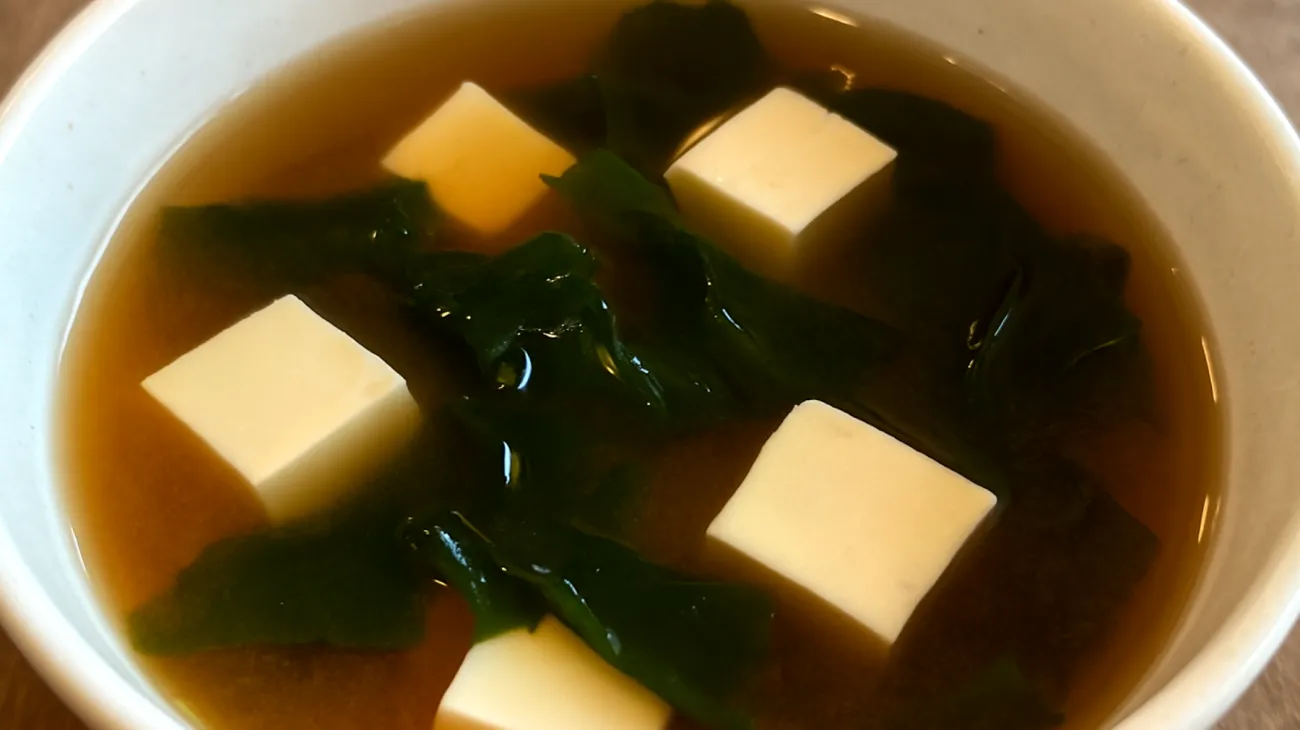The gentle steam rising from a bowl of miso soup carries more than just aromatic comfort—it delivers a sophisticated blend of nutrients with the potential to sustain energy and offer several health benefits. For professionals experiencing the 3 PM mental fog or struggling to maintain cognitive clarity, this traditional Japanese combination of fermented miso, wakame seaweed, and silken tofu supplies nutrients linked to general health and wellness, with some evidence suggesting positive effects on nervous system regulation.
The Neuroscience Behind Your Evening Bowl
What makes miso soup notable for supporting the nervous system is its content of amino acids such as tyrosine, which serves as a precursor for neurotransmitters dopamine and norepinephrine—both involved in mental focus and alertness. Legumes and soy products like miso are reasonable sources of tyrosine, and while it’s biochemically true that dietary tyrosine can support neurotransmitter synthesis, the direct cognitive benefits from miso soup consumption specifically await further clinical validation.
The wakame seaweed component contains omega-3 fatty acids, primarily in plant-based forms such as alpha-linolenic acid. While not providing the substantial EPA and DHA found in fatty fish, general omega-3 intake is associated with neuronal membrane health and reduced inflammation, which may indirectly benefit brain function. The seaweed also provides valuable iodine, supporting thyroid function and metabolic processes that influence energy levels throughout your day.
Probiotics and Your Gut-Brain Connection
The fermented miso paste introduces beneficial bacteria that can support gut health, particularly when unpasteurized. Traditional fermentation with microbes like Aspergillus oryzae produces live microorganisms that contribute to digestive wellness. Growing evidence supports the gut-brain axis concept, suggesting gut microbiota can influence aspects of mood and behavior, though specific studies on miso-derived probiotics enhancing cognitive processing speed remain limited.
Research has documented several probiotic-related benefits that make miso soup particularly appealing for busy professionals. These fermented foods support balanced mood and mental well-being through potential gut-brain axis effects, while simultaneously improving digestion and nutrient absorption due to miso’s fermented nature. Observational studies of fermented food-rich diets suggest possible reduction in systemic inflammation, with enhanced gut health contributing to overall well-being and indirect stress resilience.
Complete Protein Power from Silken Tofu
Silken tofu made from soybeans provides a complete protein, containing all nine essential amino acids necessary for tissue maintenance and neurotransmitter synthesis. Studies confirm soy protein quality as high, and its digestibility makes it particularly suitable for evening meals. This lighter protein option supports your body’s overnight repair processes without the heaviness that can interfere with quality rest.
Strategic Timing for Maximum Impact
Eating lighter, easily digestible meals in the evening generally supports better sleep and digestion. The combination of miso soup’s warmth and nutrient density makes it an ideal choice for professionals seeking to wind down while nourishing their bodies. The iodine content from wakame supports healthy thyroid function, which influences metabolic rate and, indirectly, energy and focus for the following day.

For busy professionals, the 10-minute preparation time offers a practical advantage over complex evening meals. Selecting low-sodium miso varieties becomes important for those monitoring their sodium intake, as excess sodium can contribute to hypertension and may affect sleep quality in sensitive individuals.
Professional Customizations Worth Considering
Remote workers and office professionals can enhance the soup’s benefits through strategic additions. Fresh ginger provides anti-inflammatory compounds with potential neuroprotective effects, while sesame seeds add healthy fats and micronutrients, including calcium and magnesium. However, certain considerations deserve attention for optimal results.
- Those with thyroid disease should monitor iodine intake from seaweed, as excessive consumption can influence thyroid function
- People on blood pressure medications or with cardiovascular risk should consider sodium content in miso
- Individuals with soy allergies can substitute tofu with mushrooms to retain umami flavor
The Magnesium and B-Vitamin Advantage
Miso and tofu provide magnesium, required for hundreds of enzymatic reactions, including ATP production—your cells’ primary energy currency. This mineral also helps regulate the nervous system, reducing physical tension that often accompanies mental fatigue. Magnesium’s role in supporting nervous system function is well-documented in nutritional research.
Miso serves as a source of several B vitamins, including B2, B3, and B6, which are important for energy metabolism and nervous system health. These nutrients work synergistically with the protein and healthy fats to provide sustained energy without the crash associated with high-sugar evening snacks.
Building Your Evening Wellness Ritual
Transform this simple soup into a mindful transition between work and rest. The warm broth naturally signals to your nervous system that it’s time to shift from high-alert productivity mode to relaxed evening preparation. This psychological transition, supported by the soup’s nutritional profile, creates an optimal foundation for both evening relaxation and sustained energy.
The act of consuming a warm, nourishing soup facilitates a psychological transition from the workday, reflecting broader principles of mindful eating and nutritional self-care. The combination of relaxing ritual and nutrient-dense meal supports your body’s natural evening wind-down process while preparing you for tomorrow’s challenges.
Miso soup with wakame and tofu offers beneficial proteins, minerals, and fermented probiotics with established general health effects. The beauty of this traditional combination extends beyond its impressive nutritional credentials—it represents a practical approach to supporting overall wellness through strategic evening nutrition. For the modern professional seeking sustained energy and improved well-being, this time-tested meal provides both immediate satisfaction and long-term health benefits when enjoyed as part of a balanced, healthful routine.
Table of Contents

